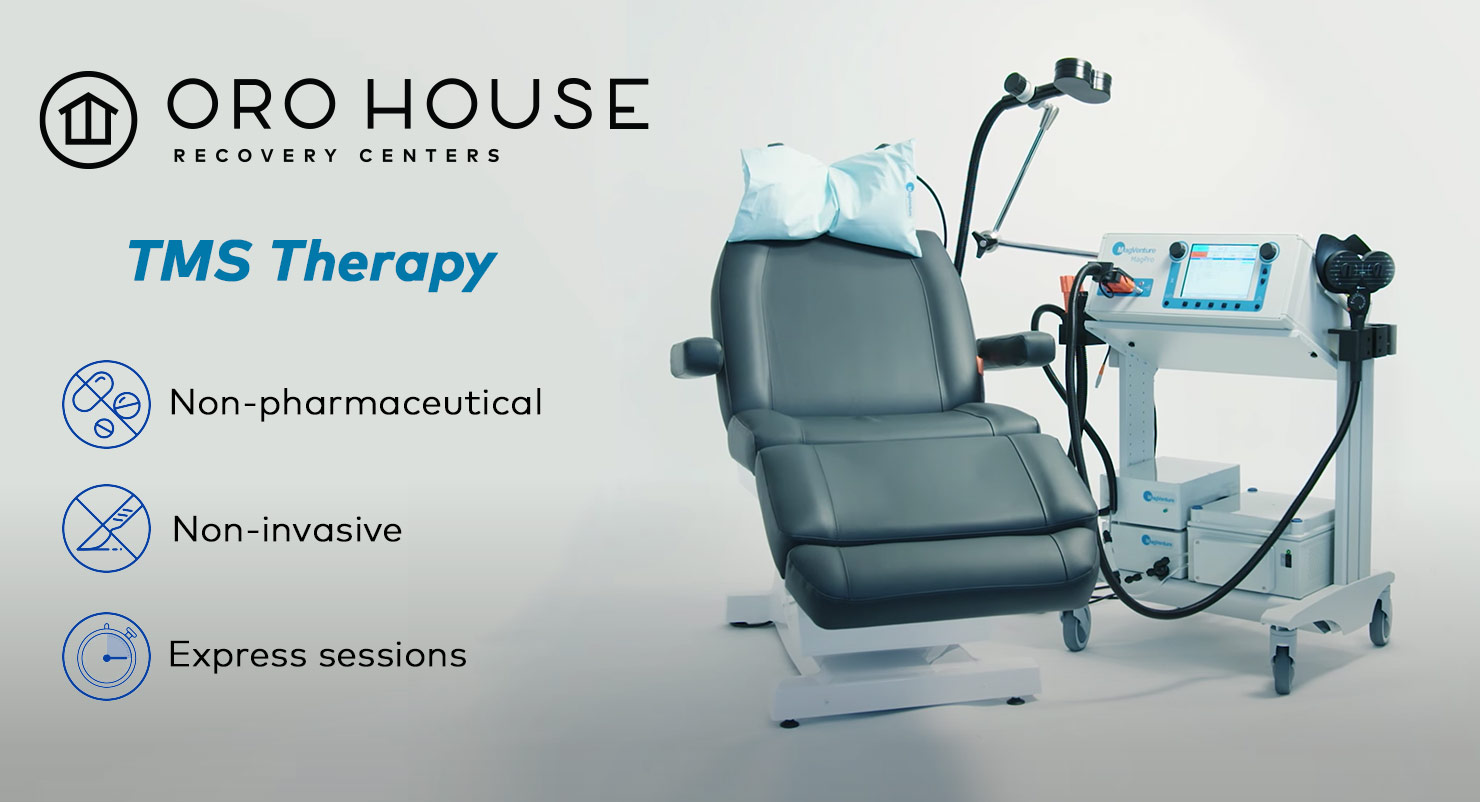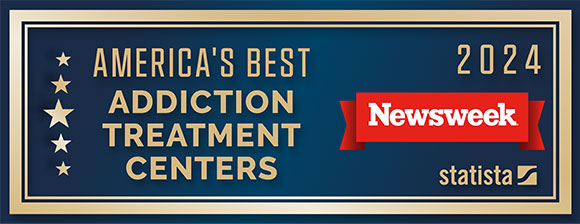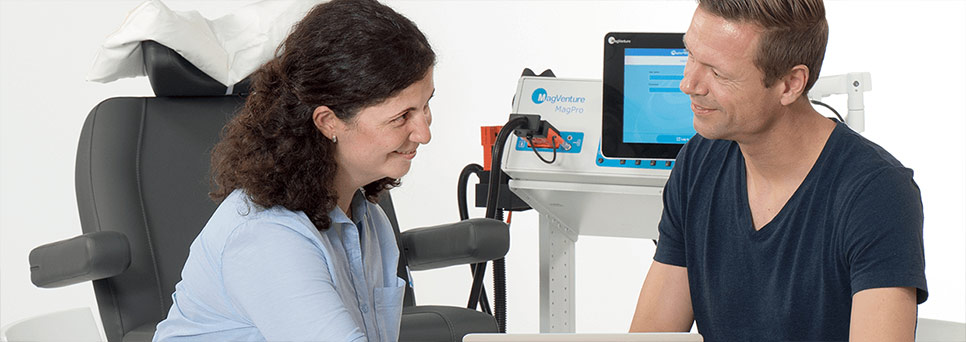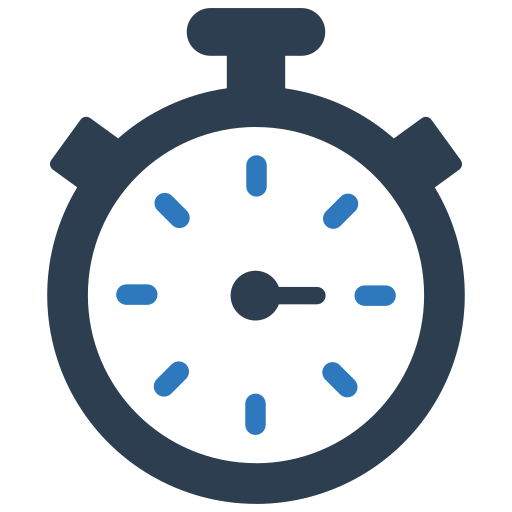The only treatment center in America offering state-of-the-art “theta burst” TMS technology in-house
Oro House uses TMS Therapy in Malibu and Los Angeles, California for treatment resistant depression and other mental health conditions, including addiction.
Our Malibu TMS Therapy is also available as an outpatient treatment method for those who are not in our residential recovery program.
Formally known as Transcranial Magnetic Stimulation (TMS), this therapy approach has been approved by the FDA for treating major depressive disorder when other therapy methods haven’t worked.


In addition to treating depression, TMS Therapy has shown to be effective for other conditions including:
- Anxiety
- Obsessive-Compulsive Disorder (OCD)
- Post-Traumatic Stress Disorder (PTSD)
- Drug and Alcohol Addiction
- Traumatic Brain Injury (TBI)
- Schizophrenia
- Migraine Headaches
Individuals who have used TMS treatment when other approaches were unsuccessful consider it a breakthrough therapy for relief from a wide range of mental health issues.
Named Best Luxury Malibu Rehab by Newsweek

Find Out How TMS Therapy Can Help With Your Depression, Mental Health, and Addiction
Transcranial Magnetic Stimulation gained FDA approval for major depression in 2008, and since that time, many facilities and patients have benefitted from the technology.
While there are many types of TMS machines, most therapy sessions can take up to 40 minutes each to complete, and a series of sessions over several weeks is usually required.
Unlike other treatment centers, Oro House uses a state-of-the-art MagVenture Theta Burst TMS Machine to reduce the typical therapy session time to just 3 minutes for many applications.
In 2018, MagVenture received FDA clearance for this short-duration protocol for major depressive disorder.
Below we outline the details of this proven therapy.
What is TMS Therapy (Transcranial Magnetic Stimulation)?
At its most basic level, TMS Therapy is essentially a non-invasive form of brain stimulation, hence the name Transcranial Magnetic Stimulation.
If it sounds scary, rest assured it is a safe and painless way to stimulate the brain while fully awake without sedation or medications.
Features of TMS Therapy
- FDA Approved
- Non-invasive therapy
- Safe and painless
- Anesthesia is not required
- Non-Systemic technology that only targets specific areas of the body
- Inpatient or Outpatient use
A certified TMS technician positions a magnetic coil over a specific area on the head, which delivers magnetic energy pulses similar to an MRI machine to regions of the brain that are associated with mood.
This stimulates or creates neuronal activity in regions of the brain that may be impaired or insufficiently produce neurotransmitters necessary for making us feel happy or normal.
TMS has proven to stimulate and improve brain functioning for many people.
This is the same goal of typical antidepressant medications, except TMS Therapy works as a physical brain stimulation method instead of a chemical one like antidepressants.
Many people with treatment-resistant depression who failed to find relief with medications found TMS to help immensely.
The real beauty of Transcranial Magnetic Stimulation is that it improves a variety of mental health conditions without the use of prescription medications and it works well with other treatment therapies.
What Happens During a TMS Therapy Session?
A typical TMS Therapy session is similar in some respects to having an MRI, except instead of lying down inside a large, claustrophobic tube, the patient is comfortably seated in a reclined chair.
A soft headpiece is placed over the scalp and a trained TMS technician positions a magnetic coil above the area of the brain that requires stimulation.
A computer delivers the repetitive magnetic pulses through the coil as needed for each person’s specific condition, which is why it is sometimes referred to as Repetitive Transcranial Magnetic Stimulation (rTMS).
Depending on the condition being treated, therapy sessions can be as short as 3 minutes.
The individual receiving the therapy remains awake the entire time and is able to resume normal daily activities shortly after completing each treatment session.
TMS is a safe and non-invasive procedure and is NOT the same as Electro Convulsive Therapy (ECT).


MagVenture Theta Burst TMS Technology reduces the typical therapy session time from 40 minutes to just 3 minutes for many applications.
How Effective is TMS Therapy?
TMS for Depression
According to Harvard Health, nearly two-thirds of the people diagnosed with depression fail to find relief after his or her first antidepressant medication treatment. However, 50% to 60% of them had a positive response from TMS Therapy with approximately one-third experiencing a full remission.
TMS for Anxiety and Depression
A 2015 study found that individuals with comorbid major depressive disorder combined with generalized anxiety disorder received rTMS treatment in an outpatient setting. Of those receiving treatment, 84% experienced a remission of anxiety symptoms and 76% for depression symptoms.
TMS for Migraines, Smoking Cessation, and OCD
According to the JAMA Network of the American Medical Association, the ability of TMS to show lasting therapeutic changes in many clinical applications has led to the FDA extending approval of this technology for treating migraine headaches, obsessive compulsive disorder, and smoking cessation.
TMS Therapy Off-Label Uses
In addition to the approved uses, TMS Therapy has also shown to be effective for many off-label uses such as PTSD, bipolar, addiction, and others.
Bipolar Disorder
Even though TMS Therapy has not been formally approved for treating Bipolar Disorder, it was granted an FDA breakthrough device designation in 2020 based on evidence supporting its efficacy for the condition.
Borderline Personality Disorder
A study published in 2018 regarding the effectiveness of TMS for treating Borderline Personality Disorder showed the symptoms decreased in all areas of BPD, especially with regards to mood swings, anger, and impulsivity.
Addiction
The National Institute of Drug Abuse (NIDA) and other researchers have seen positive results using TMS for treating methamphetamine, cocaine, and similar addictive substances as they relate to combating relapse, co-occurring and post-addiction depression. Further studies are examining craving suppression and post-addiction anxiety and mood states.
Who Can Benefit From Transcranial Magnetic Stimulation?
TMS Therapy is an ideal treatment approach for anyone with major depressive disorder who has not had success with medications for depression.
Many antidepressants can take several weeks to months to take effect in the body before adjusting doses or changing medications. Trying to find an effective medication or dose can take a long time, or produce negative side effects that aren’t well tolerated.
When this happens, the entire cycle may need to be repeated again from the start and can take even more time to identify if it is correct for each patient.
After several rounds of medication trials, it’s quite common for some people to discover antidepressants do not work well for them. This is known as treatment-resistant depression.
Transcranial Magnetic Stimulation can work very well for these individuals and many people notice an improvement almost immediately after only one or two sessions.
TMS Therapy has also shown to be successful for treating:
- Anxiety
- Post-traumatic stress disorder (PTSD)
- Addiction to drugs or alcohol
- Obsessive-compulsive disorder (OCD)
- Schizophrenia
- Some types of traumatic brain injury (TBI)
TMS Therapy at Oro House
At Oro House, we know that no two clients are the same, so we create a personalized treatment plan that best fits the individual needs of each person.
In addition to our Compassionate Care Model® of treatment, we offer the most comprehensive program in the country for dual diagnosis treatment of addiction combined with mental health issues like depression, PTSD, anxiety, OCD, and others.
Many dual diagnosis clients respond well to using a range of treatment methods, and TMS Therapy is a perfect match for our comprehensive approach.
For those who have not found success with other therapies, our treatment team will explore Transcranial Magnetic Stimulation as a viable option during the client assessment phase of our residential program.
TMS may also be used for our outpatient clients when deemed appropriate.
Oro House is licensed by the California Department of Healthcare Services (DHCS), and Joint Commission Accredited, to ensure our clients get the best treatment possible.
In 2020, 2021, 2022, and 2023, our comprehensive program was recognized as one of the Best Addiction Treatment Centers in California and America by Newsweek.